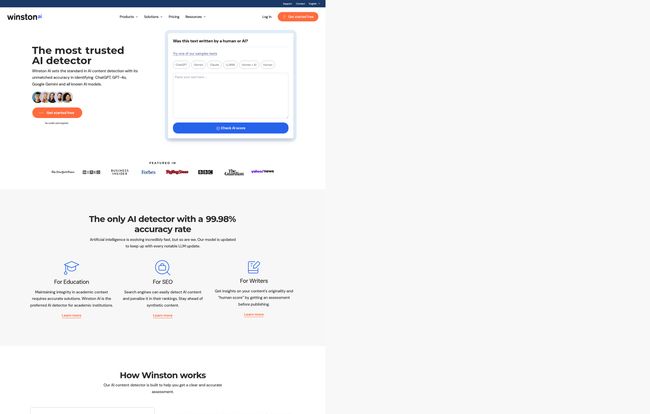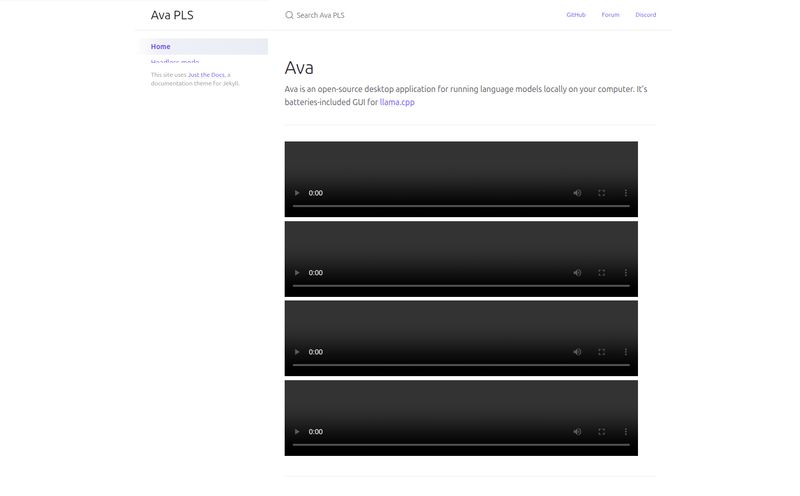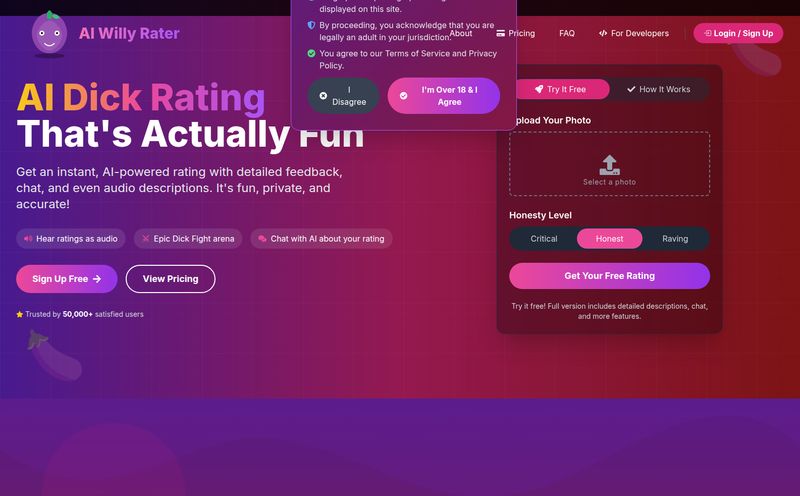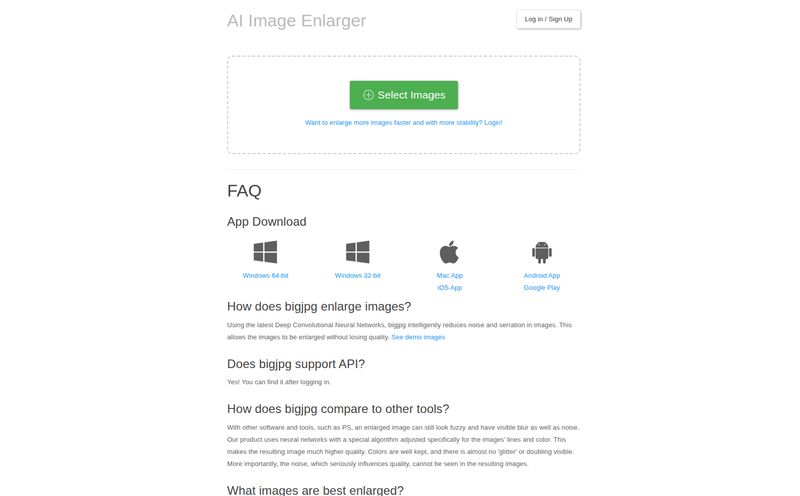We’re all living in this weird, new content reality. One minute you’re reading a beautifully written article, the next you’re hit with a creeping suspicion: “Is this… too perfect?” The sentences are flawless, the structure is impeccable, but the soul? It's just not there. It’s the uncanny valley of text, and as someone who lives and breathes content, it gives me the heebie-jeebies.
A few weeks back, I got a piece from a new freelance writer. It was good. Almost too good. The kind of clean, efficient prose that a machine would write. So I did what any self-respecting, slightly paranoid SEO blogger would do: I started hunting for a reliable AI detector. My search led me to a tool with a rather distinguished name: Winston AI. It promised the world—or at least, a 99.98% accuracy rate. And you know me, I’m a sucker for good data. So, I decided to take it for a spin.
Is it the Sherlock Holmes for our synthetic content woes? Or just another gadget in an already cluttered toolbox? Let’s get into it.
What Exactly is Winston AI? (And Why Should You Care?)
At its core, Winston AI is an AI content detector and plagiarism checker built for people who are serious about content integrity. Think publishers, academic institutions, and content agencies. But honestly, in 2024, that includes pretty much any of us running a blog or a business online. Google’s stance on AI content is all about quality and originality, and tools like Winston are becoming our first line of defense.
The big headline grabber on their site is the claim of being “the only AI detector with a 99.98% accuracy.” That’s a bold claim. In an industry where a misplaced decimal point can be the difference between success and disaster, that 0.02% margin for error is something I can live with. It’s not just sniffing out ChatGPT, either. It’s trained to detect outputs from all the major players—Google Gemini, Claude, and the legion of other GPT-based tools out there.
The Features That Actually Matter to Content Pros
A simple pass/fail on AI content is fine, but it’s not enough to justify a monthly subscription for me. I need more. Thankfully, Winston seems to understand that. Its not just a one-trick pony.
Beyond Simple AI Detection: The Plagiarism and Image Check
First off, it bundles a plagiarism checker. This is huge. I can’t tell you how many subscriptions I have floating around for different tools. Having AI detection and plagiarism checking under one roof is a clean, efficient workflow. It simplifies things, and I’m all for that. It means you can check for originality in both forms—human-copied or machine-generated—in one fell swoop.
Even more interesting, and incredibly timely, is the AI Image Detection. With the explosion of Midjourney, DALL-E, and Sora, telling a real photo from a synthetic one is getting tougher by the day. For publishers who rely on authentic imagery, this is a godsend. It's a tool for fighting deepfakes and ensuring the visuals you use are legit. Pretty neat.
Getting Actionable Feedback on Your Writing
Here’s something I didn’t expect: Winston also provides writing feedback and readability scores. This nudges it from being a simple “cop” to being more of a “coach.” It's one thing to be told a piece of text is likely AI-generated; it's another to get insights into why it might read that way. This feature can help writers (human ones!) improve their work and avoid the robotic prose that AI detectors are trained to spot.
The 'HUMN-1' Certification Badge
On some of its paid plans, Winston offers what it calls a “HUMN-1 website certification.” It's basically a badge you can display on your site to signal that your content is verified as human-created. I have mixed feelings about this. On one hand, it could be a powerful trust signal for readers who are increasingly wary of AI slop. On the other, will it become a meaningful standard, or is it just a bit of digital flair? The jury's still out, but I appreciate the forward-thinking concept.
Putting Winston AI to the Test: A Walkthrough
Okay, let’s talk user experience. I signed up for the free trial, which gives you 2,000 credits for 14 days. Plenty to kick the tires.
The process is as simple as they claim:
- Step 1: You paste your text, upload a document (it even has OCR to scan pictures of text, which is wild), or pop in a URL.
- Step 2: You hit the “Scan” button. Winston does its thing, cross-referencing against its models.
- Step 3: You get a result. A clear, color-coded verdict with a human content score.
The interface is clean, no-nonsense, and fast. The results page gives you an overall probability score. I threw a few things at it: a 100% human-written article (this one, before I finished it), a pure ChatGPT-4o output, and a “humanized” text that I’d run through a paraphrasing tool. It correctly identified all three. I was particularly impressed with it catching the paraphrased text, as that’s where many other detectors fall flat.

Visit Winston AI
Let's Talk Turkey: Winston AI Pricing and Plans
Alright, the all-important question: what’s this going to cost? Subscription fatigue is real, so the value has to be there.
Winston AI operates on a credit system, where 1 credit seems to equal 1 word. Here’s a quick breakdown of their plans (based on paying monthly—you get a discount for annual billing):
| Plan | Monthly Price | Credits per Month | Best For |
|---|---|---|---|
| Free Trial | $0 | 2,000 (for 14 days) | Trying it out |
| Essential | $18 | 80,000 | Solo bloggers, students |
| Advanced | $29 | 200,000 | Freelancers, small teams |
| Elite | $49 | 500,000 | Agencies, publishers |
The free trial is generous enough for a solid test. For me, the Advanced plan feels like the sweet spot for a small content operation, especially with the inclusion of the HUMN-1 certification and team member seats. If you're a solo operator who only occasionally works with other writers, the Essential plan is probably all you need.
The Good, The Bad, and The AI-Generated
No tool is perfect. After spending some time with Winston, here’s my honest take on where it shines and where it could improve.
The Good Stuff (My Favorite Parts)
The accuracy is genuinely impressive, especially with content designed to evade detection. The fact that it detects the latest models like Gemini and Claude and supports multiple languages is a massive plus. The all-in-one nature—AI detection, plagiarism, and even image scanning—makes it a powerful, centralized tool for maintaining content quality. It’s like a Swiss Army knife for content integrity.
The Not-So-Good Stuff (Room for Improvement)
It’s a subscription service. If you only need to check a document once in a blue moon, the monthly fee might feel a bit steep. The credit-based system also means you need to have a good sense of your monthly word count. If you have an unexpectedly high-volume month, you might find yourself needing to buy top-up credits. And of course, while the accuracy is high, it's never 100% guaranteed. Always use these tools as a guide, not as an infallible judge.
So, Is Winston AI Worth Your Money?
Here’s the bottom line. If you are a hobby blogger who writes every single word yourself and never publishes content from anyone else, you can probably skip this. But if you're in a role where you manage, edit, or publish content from multiple sources—freelancers, guest authors, or even AI-assisted drafts—then a tool like Winston AI shifts from being a 'nice-to-have' to a 'need-to-have'.
It’s for the serious content professional who needs to protect their site’s reputation, ensure originality, and maintain a high standard of quality. It’s an investment in trust—trust with your audience and trust with search engines.
For me, the peace of mind it provides is worth the monthly fee. That suspicious article from the freelancer? Winston flagged it as 80% likely to be AI-generated. And that confirmation saved me a potential headache down the road. It’s not just a tool for catching cheaters; it’s a tool for upholding standards.
Conclusion
In the cat-and-mouse game of AI vs. human content, Winston AI feels like a serious advantage for the humans. It's robust, accurate, and packed with features that address the real-world challenges of publishing content today. It isn't just about detecting robots; it's about championing authenticity. In a world awash with synthetic text, being able to confidently stand behind your content is more valuable than ever. And Winston AI is one of the best partners I’ve found for that job.
Frequently Asked Questions about Winston AI
- How accurate is Winston AI?
- Winston AI claims a 99.98% accuracy rate in detecting AI-generated content. My own tests found it to be highly reliable, even with text that was paraphrased or “humanized.”
- Can Winston AI detect content from Google Gemini and Claude?
- Yes, it's designed to detect content from all the latest major AI models, including those from Google, Anthropic (Claude), and OpenAI (ChatGPT).
- Does Winston AI offer a free trial?
- Absolutely. They offer a 14-day free trial that includes 2,000 credits, allowing you to test out all the core features before committing to a paid plan.
- What is the HUMN-1 website certification?
- It's a digital badge awarded to websites that consistently publish human-generated content, as verified by Winston AI. It's intended to be a trust signal for visitors, showing your commitment to authenticity.
- How does the credit system work in Winston AI?
- The system is based on word count. Scanning one word costs one credit. So, a plan with 80,000 credits allows you to scan up to 80,000 words per month.
- Is Winston AI just for text?
- No, a key feature is its versatility. It can scan pasted text, uploaded documents (like .docx and .pdf), and even scan text from images using Optical Character Recognition (OCR). It also has a separate feature for detecting AI-generated images.



